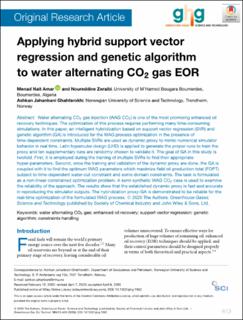| dc.contributor.author | Nait Amar, Menad | |
| dc.contributor.author | Zeraibi, Noureddine | |
| dc.contributor.author | Jahanbani Ghahfarokhi, Ashkan | |
| dc.date.accessioned | 2020-09-14T09:12:45Z | |
| dc.date.available | 2020-09-14T09:12:45Z | |
| dc.date.created | 2020-05-04T11:33:41Z | |
| dc.date.issued | 2020 | |
| dc.identifier.citation | Greenhouse Gases: Science and Technology. 2020, 1-18. | en_US |
| dc.identifier.issn | 2152-3878 | |
| dc.identifier.uri | https://hdl.handle.net/11250/2677591 | |
| dc.description.abstract | Water alternating CO2 gas injection (WAG CO2) is one of the most promising enhanced oil recovery techniques. The optimization of this process requires performing many time‐consuming simulations. In this paper, an intelligent hybridization based on support vector regression (SVR) and genetic algorithm (GA) is introduced for the WAG process optimization in the presence of time‐dependent constraints. Multiple SVRs are used as dynamic proxy to mimic numerical simulator behavior in real time. Latin hypercube design (LHD) is applied to generate the proper runs to train the proxy and ten supplementary runs are randomly chosen to validate it. The goal of GA in this study is twofold. First, it is employed during the training of multiple SVRs to find their appropriate hyper‐parameters. Second, once the training and validation of the dynamic proxy are done, the GA is coupled with it to find the optimum WAG parameters which maximize field oil production total (FOPT) subject to time‐dependent water‐cut constraint and some domain constraints. The task is formulated as a non‐linear constrained optimization problem. A semi‐synthetic WAG CO2 case is used to examine the reliability of the approach. The results show that the established dynamic proxy is fast and accurate in reproducing the simulator outputs. The hybridization proxy‐GA is demonstrated to be reliable for the real‐time optimization of the formulated WAG process. © 2020 The Authors. Greenhouse Gases: Science and Technology published by Society of Chemical Industry and John Wiley & Sons, Ltd. | en_US |
| dc.language.iso | eng | en_US |
| dc.publisher | Wiley | en_US |
| dc.rights | Navngivelse 4.0 Internasjonal | * |
| dc.rights.uri | http://creativecommons.org/licenses/by/4.0/deed.no | * |
| dc.title | Applying hybrid support vector regression and genetic algorithm to water alternating CO2 gas EOR | en_US |
| dc.type | Peer reviewed | en_US |
| dc.type | Journal article | en_US |
| dc.description.version | publishedVersion | en_US |
| dc.source.pagenumber | 1-18 | en_US |
| dc.source.journal | Greenhouse Gases: Science and Technology | en_US |
| dc.identifier.doi | 10.1002/ghg.1982 | |
| dc.identifier.cristin | 1809192 | |
| dc.description.localcode | © 2020 The Authors. Greenhouse Gases: Science and Technology published by Society of Chemical Industry and John Wiley & Sons Ltd. This is an open access article under the terms of the Creative Commons Attribution License, which permits use, distribution and reproduction in any medium, provided the original work is properly cited. | en_US |
| cristin.ispublished | true | |
| cristin.fulltext | preprint | |
| cristin.qualitycode | 1 | |

